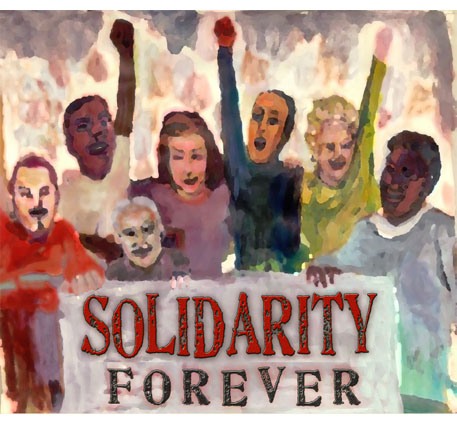OPINION
Labor Day: Why we continue to join together
The following guest column appears in today’s edition of The Seattle Times.
 By JEFF JOHNSON
By JEFF JOHNSON
(Sept. 4, 2017) — My sisters and I grew up during the 1950s and 1960s in a single-parent household on Long Island, New York. Mom worked as a secretary for the local Chamber of Commerce and later as an aide to a rising state political star. As a state employee, her wages and benefits — and the prosperity of our family — rose thanks to union-negotiated contracts.
Braces, eyeglasses, asthma medication, broken bones set, vacations, summer programs and a modest house were all provided to my family because workers like my mother had the freedom to negotiate a fair return on the value of their labor.
My children have grown up in a union family, know their rights at the workplace, have walked picket lines and understand that most of their generation has a raw deal. They joined the labor market during and after this century’s “Great Recession,” in an age of obscene income inequality. The general expectation is that my kids’ generation will be the first to have a lower standard of living than their parents.
 My children understand the role unions have played in building the middle class, but most young people have been deprived of that information and analysis. Most are unaware of the concerted attack on unions by those who promote so-called “Right-To-Work” laws.
My children understand the role unions have played in building the middle class, but most young people have been deprived of that information and analysis. Most are unaware of the concerted attack on unions by those who promote so-called “Right-To-Work” laws.
The term “Right-To-Work” has its historical origins in the Jim Crow era and was designed to keep the races from mingling and to keep black people from moving up the economic ladder. The term itself is the perfect ruse because it does not confer the right for people to work. We all have a Constitutional and human right to work.
This ploy allows workers to be represented by unions but have the “right” not to pay for that representation. Its proponents are betting that workers squeezed in this economy won’t pay, and that unions will wither and die as a result.
The goal is straightforward. Weaken the voice of unions at the negotiating table and you lower wages and benefits, or at least keep them in check. Weaken the voice of unions in the political sphere and you undercut the push for higher minimum and prevailing wages, paid sick leave, “Medicare for All” universal health care, fair tax reform and creating a just transition away from a fossil fuel economy toward a clean, alternative energy economy.
The latter may come as a surprise until we connect the dots. The Koch brothers and other billionaire families that derive much of their wealth from fossil fuels are also the ones funding the “Right-To-Work” movement across the country. The Freedom Foundation in our state is one of the many organizations that has taken up this cause.
What I find most encouraging this Labor Day is that millennials with support across generations and progressive organizations are raising their voices to call for an end to inequality. They are making the connections between the Fight for $15, Black Lives Matter and climate-justice movements. They recognize that the economic transition so far has been anything but fair and just.
The labor movement is the coming together of unions, community, faith-based organizations, LGBTQ organizations, communities of color, youth, seniors, environmental organizations and immigrants. Together, we can create a fair and just transition away from inequality and toward a healthy economy and environment.
Jeff Johnson is President of the Washington State Labor Council, AFL-CIO, the largest labor organization in the Evergreen State, representing the interests of more than 500 local unions and 450,000 rank-and-file union members.





